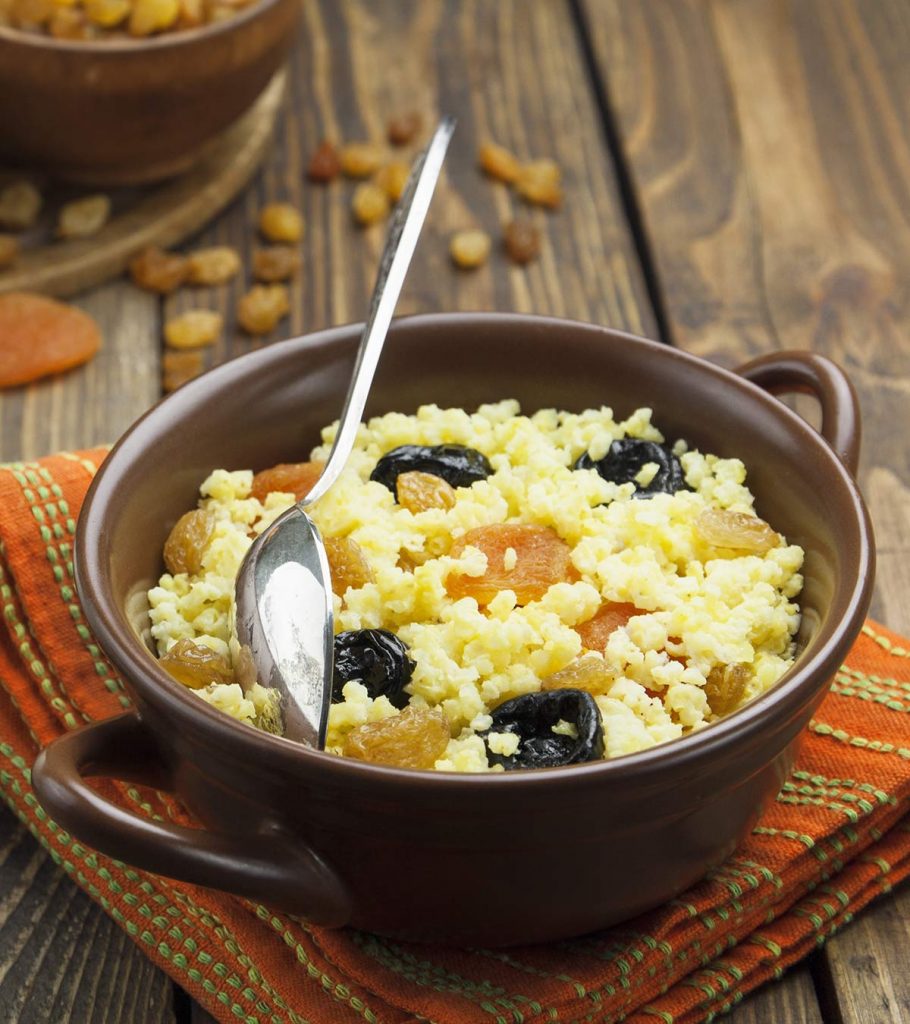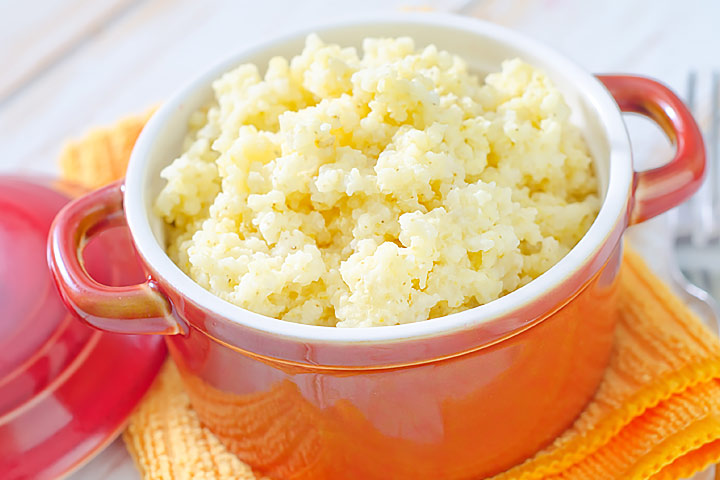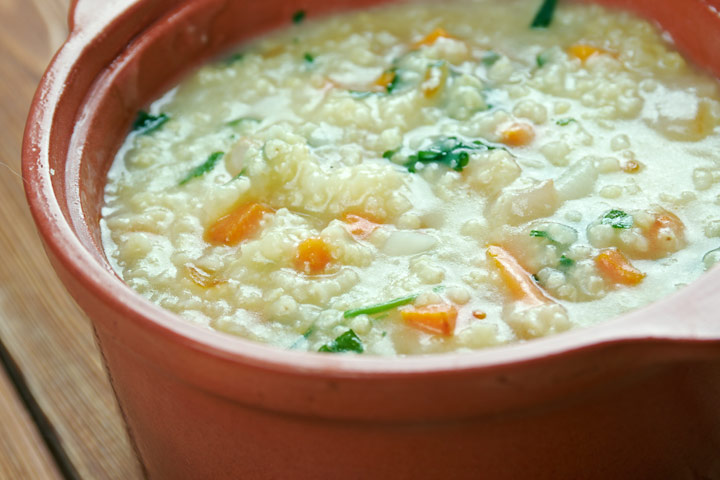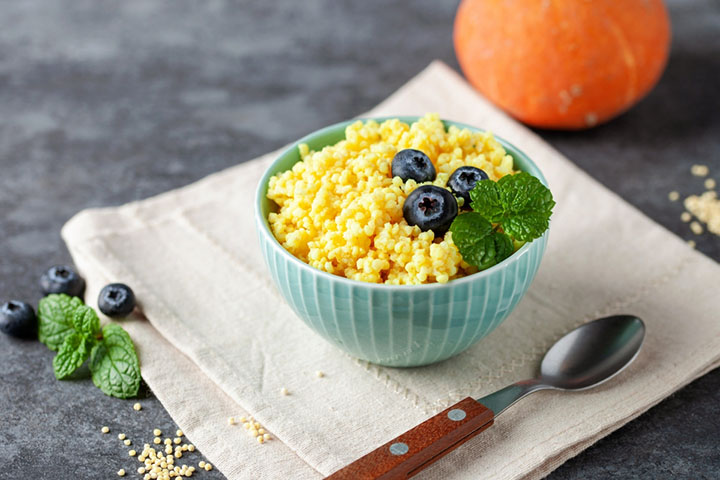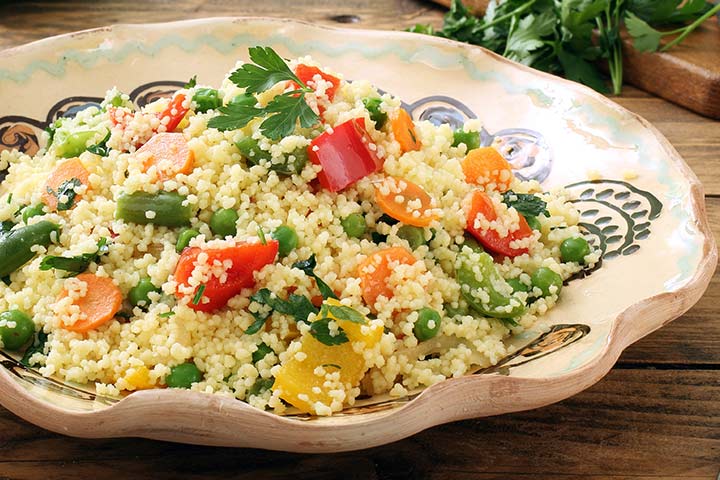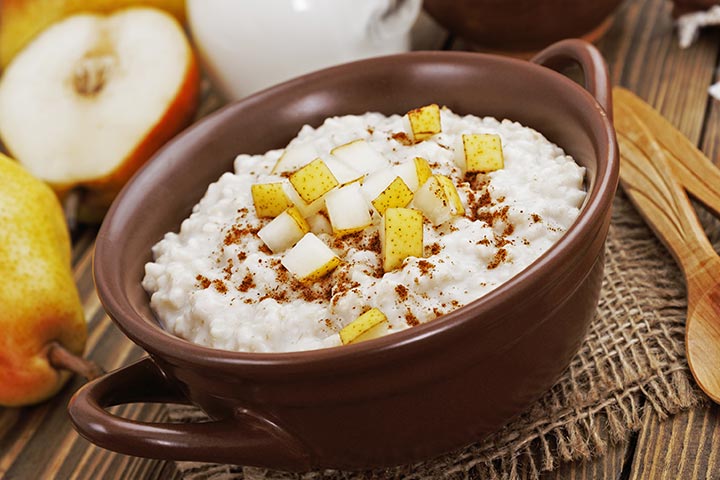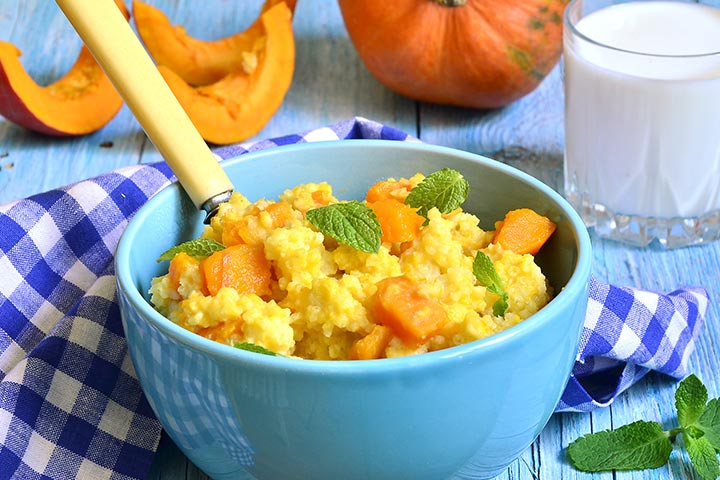Millet is one of the several nutritious ancient grains that are safe for infants. It can make for a healthy, wholesome meal that is easily digestible, gluten-free, and versatile. The benefits of millet for babies are numerous as it is rich in iron, minerals, calcium, and more, aiding in the healthy and steady growth of the baby.
In addition, millet can be easily digested due to its smooth texture. The grain is also versatile and can be incorporated into your baby’s diet in different ways, such as through homemade porridges or stews.
Continue reading to know more about millet and its benefits, as well as some healthy and delicious millet recipes for babies.
Is Millet Good For Babies?
Millet is a good protein source and is rich in multiple vitamins, phosphorus, potassium, iron, and magnesium. One cup of cooked millet contains the following nutritional values (1):
- Protein – 6.11g
- Thiamine (Vitamin B1) – 0.18mg
- Riboflavin (Vitamin B2) – 0.14 mg
- Folate – 33mcg
- Niacin – 2.3mg
- Phosphorus – 174mg
- Potassium – 108mg
- Sodium – 3mg
- Calcium – 5mg
- Magnesium – 77mg
- Iron – 1.1mg
Millet also contains trace amounts of copper, zinc and manganese. It has high amounts of fiber, essential amino acids like lecithiniX A plant-derived fat that is required by the body’s cells to carry out metabolic processes and methionine, and phytic acidiXA plant-based substance and antioxidant which stores phosphorus that help reduce the risk of cancer and lower blood cholesterol.
When Can Your Baby Eat Millets?
Give millet to your little one at around six to eight months, along with continued breast milk or formula intake. When you introduce a new solid food, give only a spoonful, and then gradually increase its quantity. Homemade millet cereal for babies is the best option. But before introducing this food, you should consult your pediatrician (2).
Health Benefits Of Millet For Babies
Millet has a mild flavor with protein content similar to rice and wheat. It will, therefore, satisfy a hungry baby’s appetite. Following are the amazing health benefits of millet for babies (3):
1. Easily digestible:
Millet are gluten-free and soothing cereals. Thus, they possess smooth digestion properties.
2. Maintains body processes:
The essential mineral phosphorus helps form bones and utilize fats, carbohydrates, and protein for various functions to keep our body working properly.
3. Improves iron deficiency:
Millet is an excellent source of iron and cures anemia in babies. According to a study that was conducted by the World Health Organization an estimated 39.8% of children between the age of 6 and 59 months suffered from anemia in 2019.
4. Supports bone development:
Millet contains a high proportion of calcium and regulates the bone development process of small and growing children.
5. Helps with constipation:
Millet contains soluble and insoluble fiber, which helps improve constipation.
6. Calms mood:
Millet is a complex carbohydrate that helps in producing serotoniniXA molecule secreted in the brain that transports messages from nerve cells and helps regulate mood, sleep, and appetitein the body. Serotonin can help calm your baby’s mood and help them sleep well (4).
Selection And Storage Of Millets For Babies
You can store whole millets for several months in a dry and cold place. If you choose packaged millet, you will also have an expiration date that helps you know the storage period. Store them in airtight containers and put them in a refrigerator.
Regarding ground millets, you have to be extra careful. The natural oils from the cereal turn rancid if not kept in the fridge.
Also, make sure you check the grains if you don’t use them frequently. It is good to buy millet in small quantities so that it does not get rancid.
Cooking Millets For Babies
Now that you know why millet is right for your baby, let us look at some millet recipes.
1. Millet Porridge Cereal:
You Will Need:
- 3 tbsp millet
- 1 cup water
How To:
- Boil one cup of water in a saucepan.
- Grind three tablespoons of millet to make a smooth powder.
- Add the ground millet into boiling water. You may add salt, but it is optional.
- Stir the contents continuously.
- Cover the saucepan for 10 minutes.
- Millet porridge for the baby is ready now.
2. Millet, Carrots And Apples Stew:
You Will Need:
- Diced carrots
- Diced apples
- ¾ cup of apple juice
- 1 cup of water
- Millet (powdered)
How To:
- In a saucepan, add diced carrots, water, diced apples and apple juice.
- Bring the mixture to a boil and cover the stew for 15-20 minutes. Add the powdered millet and cook for 5 more minutes.
- You can replace millet powder with rice cereal to make a delicious homemade porridge for your little one.
3. Toasted Millet Baby Cereal:
You Will Need:
- 1 cup whole grain millet
- 2 cups boiling water
- 1 tbsp vegetable oil, preferably olive oil
How To:
- Take oil in a large pan and heat it.
- Add millet and sauté it. Continue stirring until the millet turns brown.
- Add two cups of boiling water and keep on simmer for 30 minutes.
- Stir it until it fluffs a bit.
- You can now add fruits, and veggies that are appropriate for your little one.
4. Millet Veggie Salad:
You Will Need:
- Soft cooked millet, peas, carrots and chicken or beef
How To:
- Toss all the above ingredients in a bowl.
- Mix properly and serve as a snack or a meal.
5. Apple Pear Millet Porridge:
You Will Need:
- 2tbsp millet
- One-and-a-half cup water
- 1/2 small green apple, peeled and cored
- 1/2 small pear, peeled and cored
How To:
- Rinse millet under running water by placing it in a coffee strainer.
- Take it in a pot and cook for half-an-hour until the porridge attains thick consistency.
- Mash apple and pear pieces using a fork and add to the porridge.
- Let it stand for five minutes and then serve your little one.
6. Organic Pumpkin Millet Porridge:
You Will Need:
- 2tbsp millet, hulled
- 1tbsp pumpkin
- 2 or more cups water
How To:
- Take water in a pan and allow it to boil.
- Add millet and pumpkin and keep it to boil.
- Simmer it over medium heat and add water if required.
- Cook for about 40 minutes until the porridge is ready.
- Cool for some time and then offer it to your baby.
7. Homemade Finger millet porridge
You Will Need:
- 2 tbsp finger millet or ragi (soaked overnight)
- 2 or more cups water
- 1tsp salt
- 1tsp palm jaggery syrup
- 1tsp ghee
How To:
- Rinse the soaked finger millet and grind smoothly with a quarter cup of water.
- Filter the ragi puree through a fine sieve to acquire ragi milk.
- Dilute the obtained millet milk with three-fourth cup of water and add salt.
- Simmer the milk over medium flame while stirring continuously to avoid lumps.
- Once the mixture turns thick and glossy, add the ghee and palm jaggery syrup.
- Take off the flame once it stops sticking to the pan.
- Cool for some time, and then feed it to your baby.
Sharing her experience of feeding millet porridge to her child, a mother from Norway, Chitra says, “I wanted to start the baby food recipe series with DD’s (son) first food. Yes, this was what he had first. Ragi kanji or ragi paal koozh… I started this after he turned 5 months old. He liked it and was very enthusiastic to have it then… Some say that ragi can cause cold and is not suitable to be had in the evening or night. I give DD kooravu only during daytime and that too before 11 am and I avoid it when he has a cold (i).”
By including millet in your baby’s diet, you will help improve her health and boost her immunity. Remember, different foods contain different nutrients, so don’t feed them with the same food all the time. Instead, mix different millets or combine millets with grains to create tasty and nutritious multi-grain dishes for your baby.
A Word Of Caution
Millet is highly nutritious and has many health benefits for your little one. However, if she suffers from wheat allergiesiXAn allergic reaction to wheat-containing foods that may cause symptoms such as rashes, stomach pain, and diarrhea or other conditions, check with her pediatrician before you include millet in her diet. Millet needs to be processed in a wheat-free facility.
Millets for babies are a healthy option to provide the required nutrients for their growth. They are easy to digest, hypoallergenic, and gluten-free. Ensure to choose and store millets carefully. Millets may be introduced to babies from around six months of age in small quantities with breast milk or formula feeding. They can be prepared in several ways, such as porridge and toasted cereals, or cooked with other vegetables for enhanced taste and optimum infant nutrition. Though millets are considered safe for babies, it is best to consult a doctor, especially if your baby has food allergies.
Key Pointers
- Millet contains various nutrients such as carbohydrates, proteins, fiber, vitamins, and minerals.
- It can be introduced to babies after they cross six or eight months.
- It is easy to digest, supports bone development, and reduces constipation.
- It promotes body functions and supports overall development in babies.
- Millet dishes such as millet porridge, millet baby cereal, and millet veggie salad are easy to prepare and serve for babies.
